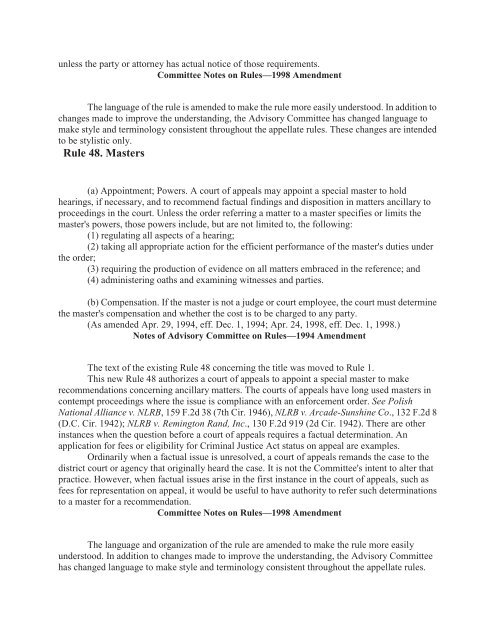Federal Rules of Appellate Procedure 2014-2015, 2014a
Federal Rules of Appellate Procedure 2014-2015, 2014a
Federal Rules of Appellate Procedure 2014-2015, 2014a
Create successful ePaper yourself
Turn your PDF publications into a flip-book with our unique Google optimized e-Paper software.
unless the party or attorney has actual notice <strong>of</strong> those requirements.<br />
Committee Notes on <strong>Rules</strong>—1998 Amendment<br />
The language <strong>of</strong> the rule is amended to make the rule more easily understood. In addition to<br />
changes made to improve the understanding, the Advisory Committee has changed language to<br />
make style and terminology consistent throughout the appellate rules. These changes are intended<br />
to be stylistic only.<br />
Rule 48. Masters<br />
(a) Appointment; Powers. A court <strong>of</strong> appeals may appoint a special master to hold<br />
hearings, if necessary, and to recommend factual findings and disposition in matters ancillary to<br />
proceedings in the court. Unless the order referring a matter to a master specifies or limits the<br />
master's powers, those powers include, but are not limited to, the following:<br />
(1) regulating all aspects <strong>of</strong> a hearing;<br />
(2) taking all appropriate action for the efficient performance <strong>of</strong> the master's duties under<br />
the order;<br />
(3) requiring the production <strong>of</strong> evidence on all matters embraced in the reference; and<br />
(4) administering oaths and examining witnesses and parties.<br />
(b) Compensation. If the master is not a judge or court employee, the court must determine<br />
the master's compensation and whether the cost is to be charged to any party.<br />
(As amended Apr. 29, 1994, eff. Dec. 1, 1994; Apr. 24, 1998, eff. Dec. 1, 1998.)<br />
Notes <strong>of</strong> Advisory Committee on <strong>Rules</strong>—1994 Amendment<br />
The text <strong>of</strong> the existing Rule 48 concerning the title was moved to Rule 1.<br />
This new Rule 48 authorizes a court <strong>of</strong> appeals to appoint a special master to make<br />
recommendations concerning ancillary matters. The courts <strong>of</strong> appeals have long used masters in<br />
contempt proceedings where the issue is compliance with an enforcement order. See Polish<br />
National Alliance v. NLRB, 159 F.2d 38 (7th Cir. 1946), NLRB v. Arcade-Sunshine Co., 132 F.2d 8<br />
(D.C. Cir. 1942); NLRB v. Remington Rand, Inc., 130 F.2d 919 (2d Cir. 1942). There are other<br />
instances when the question before a court <strong>of</strong> appeals requires a factual determination. An<br />
application for fees or eligibility for Criminal Justice Act status on appeal are examples.<br />
Ordinarily when a factual issue is unresolved, a court <strong>of</strong> appeals remands the case to the<br />
district court or agency that originally heard the case. It is not the Committee's intent to alter that<br />
practice. However, when factual issues arise in the first instance in the court <strong>of</strong> appeals, such as<br />
fees for representation on appeal, it would be useful to have authority to refer such determinations<br />
to a master for a recommendation.<br />
Committee Notes on <strong>Rules</strong>—1998 Amendment<br />
The language and organization <strong>of</strong> the rule are amended to make the rule more easily<br />
understood. In addition to changes made to improve the understanding, the Advisory Committee<br />
has changed language to make style and terminology consistent throughout the appellate rules.


















